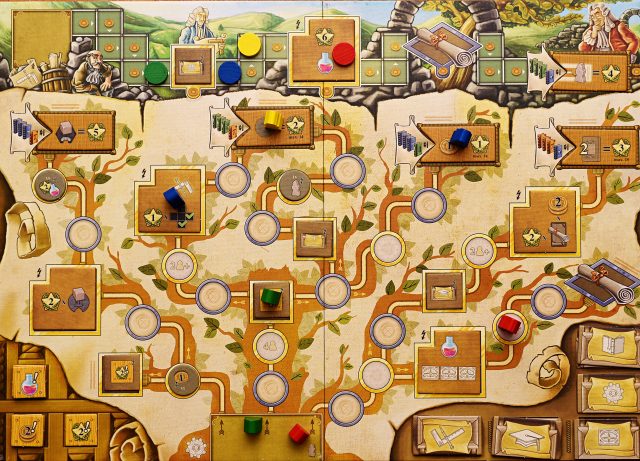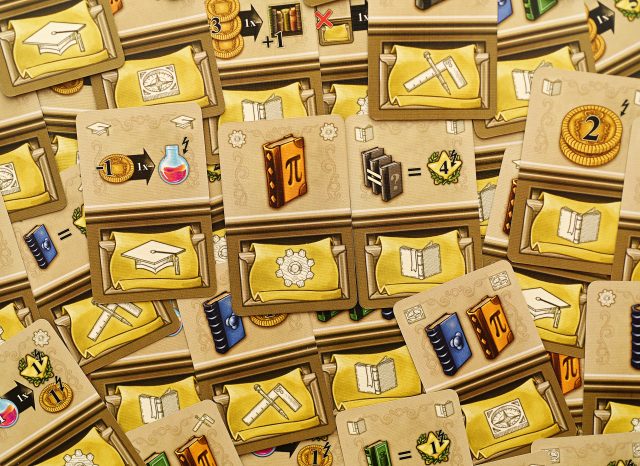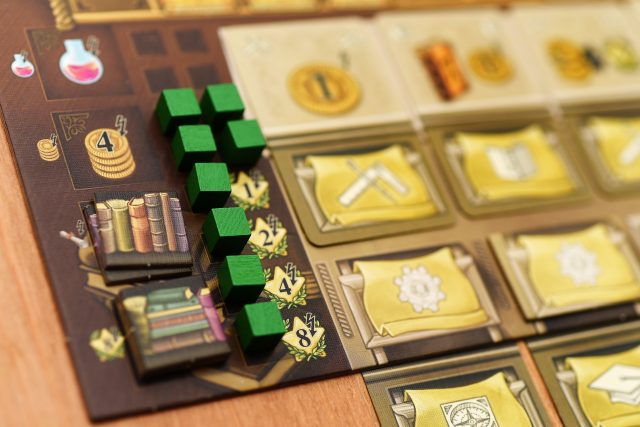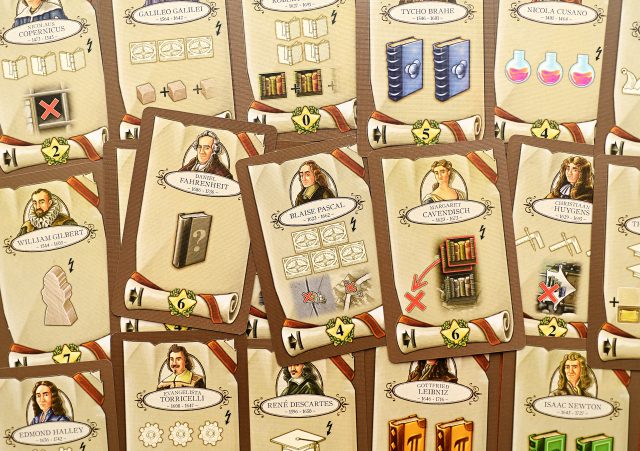I like all types of games, but it wasn’t always that way. I got into the hobby (like so many of us) through the Settlers of Catan, Carcassonne, and Puerto Rico, and while they don’t get to the table as often as I’d like, I still enjoy playing them whenever they do. Over the years, my tastes have changed and evolved. I’ve come to find the joys of party or dexterity games, passing countless hours trying to find the spies in Resistance, or racing to earn points in La Boca. I know how easy it is to have fun with any type of game if you come in with the right attitude. Now that being said, I do always find myself being drawn back to my brown master, the Euro. When a mechanically tight, strategic, game comes out, I’m always really excited to try it out. When a new game from the designers of Lorenzo il Magnifico, The Voyages of Marco Polo, and Grand Austria Hotel was announced, you can bet it was high on my list of games to play.
 There was once a time (improbable as it may seem right now) when people were exalted for their great minds and contributions to science, math, geography, literature, and knowledge in general. While those days may feel long gone, Newton allows players to travel back to the 18th Century, a time when scientific discoveries were awakening people to the inherit truth of the world around them. Players take on the role of young scholars, looking to follow in the footsteps of Newton and other great thinkers of the period. Through traveling around Europe, devoting yourself to expanding your knowledge, studying the works of revolutionary minds, and diligently working on revolutionary theories and technological inventions, you look to become one of the next Master of critical thought.
There was once a time (improbable as it may seem right now) when people were exalted for their great minds and contributions to science, math, geography, literature, and knowledge in general. While those days may feel long gone, Newton allows players to travel back to the 18th Century, a time when scientific discoveries were awakening people to the inherit truth of the world around them. Players take on the role of young scholars, looking to follow in the footsteps of Newton and other great thinkers of the period. Through traveling around Europe, devoting yourself to expanding your knowledge, studying the works of revolutionary minds, and diligently working on revolutionary theories and technological inventions, you look to become one of the next Master of critical thought.
Newton is played over six rounds, with five turns for each player, each round. On a turn, you’ll play a card to your desk to perform one of various available actions. The map board represents Europe and many of the great Universities and Ancient Lands where you could travel to. The Tracks board represents the Work and Technology tracks that you can advance along.
 There are five different actions available to you on a turn. You start with a hand of six relatively weak cards (the five actions plus a wild). You’ll also start with your very own bookshelf, ready to house your acquired knowledge and 12 Travel cubes that you can use to mark your progress around Europe. When you play one of the cards to your desk, you perform that action to the strength of the number of symbols of that action that you have played (or weaker if that benefits you). Your desk also starts with a symbol already attributed to it, giving you an asymmetrical starting position and possibly informing your strategy.
There are five different actions available to you on a turn. You start with a hand of six relatively weak cards (the five actions plus a wild). You’ll also start with your very own bookshelf, ready to house your acquired knowledge and 12 Travel cubes that you can use to mark your progress around Europe. When you play one of the cards to your desk, you perform that action to the strength of the number of symbols of that action that you have played (or weaker if that benefits you). Your desk also starts with a symbol already attributed to it, giving you an asymmetrical starting position and possibly informing your strategy.
When you play a card with the Work symbol, you move forward on the Work track. This earns you money and potentially other rewards. The amount of spaces you move forward is determined by the amount of Work symbols you have on display on your desk.
When you play a card with the Technology symbol, you can move one of your student pawns up the Technology track. It looks like an actual tech tree, with many different branching routes to pursue. There are various rewards you can take advantage of as you move up the track as well as objectives at the end of each route which can earn you big end game points. As you hit forks in the road, you’ll have to decide which direction your student will go. Once they’ve committed, they can’t change their mind, so choose carefully. You can get more students on the track, but they don’t come cheap. You’ll move as many spaces up the Tech track as symbols you’ve played.
Playing the Travel symbol allows you to move around Europe visiting Cities, Universities, and Ancient Lands. As always, you move as many spaces as the Travel symbols you’ve already played on the round. Some of the routes will cost you money to traverse. When you end your turn, you can drop one of your Travel cubes to indicate you’ve been to that location and take any reward that may be associated with it.
 At this moment, I’m going to pause in my description of the possible actions, to describe how the end of a round works. Trust me, this will make sense.
At this moment, I’m going to pause in my description of the possible actions, to describe how the end of a round works. Trust me, this will make sense.
When everyone has played five action cards, they will take any income they earn, and any points they get for filling out sections of their bookshelf (we’re getting there), then take one of the action cards they’ve played that round and slide it underneath their board so only the action symbol is showing. This works both as an indicator of the round of the game you’re in, as well as providing you more strength when you play that symbol in future rounds. Choosing which card to put down there is important, because it will help and drive your strategy going forward, but also it means, that is one less card in your hand. Which brings us to…
The Lessons action allows you to take new action cards into your hand. They come in three different strength levels, and as you’d expect, the stronger the card the better the action. Depending how many Lessons symbols you’ve played, you can take from the first, second, or third row of action cards. This is going to be a necessary play at least a few times during the game, because your starting hand is relatively weak in the actions they allow, and also because, you’re losing a card each round. Ignore it at your peril.
 The final possible action is the Study action. I mentioned that your desk has a bookshelf that you’re going to try and fill out throughout the game. There are three different levels to the shelf, plus requirements of either locations visited or books played on the round before you can add one of your book tiles to a location on the shelf. The shelf is made of rows and columns which will earn points for you each round, if they’ve been completely filled in. It behoves you to fill in different sections as quickly as possible to earn points throughout the game, but of course the rows and columns worth the most points are the hardest ones to fill. Potions are a resource that can be earned during the game in various ways, and they can be spent to replace some of the requirements for adding books to your shelf. A helpful shortcut to use for more points.
The final possible action is the Study action. I mentioned that your desk has a bookshelf that you’re going to try and fill out throughout the game. There are three different levels to the shelf, plus requirements of either locations visited or books played on the round before you can add one of your book tiles to a location on the shelf. The shelf is made of rows and columns which will earn points for you each round, if they’ve been completely filled in. It behoves you to fill in different sections as quickly as possible to earn points throughout the game, but of course the rows and columns worth the most points are the hardest ones to fill. Potions are a resource that can be earned during the game in various ways, and they can be spent to replace some of the requirements for adding books to your shelf. A helpful shortcut to use for more points.
Aside from the major actions the cards allow, some of them will give instant bonuses or allow you to spend points or resources to gain some benefit. You also can do a number of quick actions on your turn, including spending coins to turn over new action cards or to increase the value of an action. Coins can also buy you Potions or enroll a new student to the Technology track.
Have I mentioned the Master cards yet? They represent some of the great minds of the time like Pascal, Cavendisch, and of course Newton. You’ll be dealt four at the beginning of the game, and either keep them or draft, depending on your experience level. Certain conditions, like advancing on the Work or Technology tracks, travelling Europe, or filling your bookshelf will allow you to play out one of your Master cards giving you a huge bonus. The Masters feel a bit like the different characters you can get in The Voyages of Marco Polo. Each one is incredibly valuable and beneficial depending on your strategy, enough so, that if you find some synergies, they might dictate your strategy.
 Now, if your head isn’t spinning yet, you may have glazed over a bit. I’m not going to lie, there is a lot going on in this game. At the same time, it all comes together so flawlessly, it’s pretty easy to learn. Developing a winning strategy may be another story. It’s the type of game that you want to play again as soon as you finish a round, cause you want to explore new strategies or try something different. Although there are a lot of rules, they are not tough to get your head around. You pick them up quick, and the difficulty comes in the decision making process, not the comprehension.
Now, if your head isn’t spinning yet, you may have glazed over a bit. I’m not going to lie, there is a lot going on in this game. At the same time, it all comes together so flawlessly, it’s pretty easy to learn. Developing a winning strategy may be another story. It’s the type of game that you want to play again as soon as you finish a round, cause you want to explore new strategies or try something different. Although there are a lot of rules, they are not tough to get your head around. You pick them up quick, and the difficulty comes in the decision making process, not the comprehension.
So, I’ve written more than enough about the game. Newton is fun, Euro, brown, and highly re-playable. I’d say it’s my favourite so far from this design team. Considering their pedigree, that’s saying quite bit. There are so many games coming out these days, that Newton very well may be lost in a sea of flashier titles, but if you can get your hands on a copy, I highly recommend giving it a shot. Exercise your brain in a game about getting smarter!
Comments
No comments yet! Be the first!